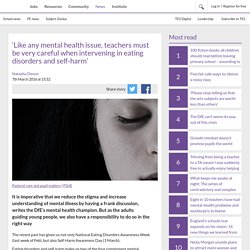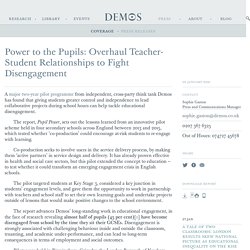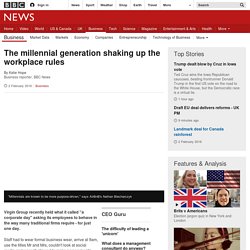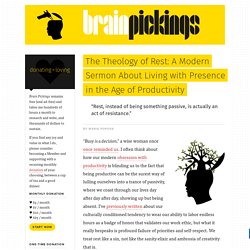

‘Like any mental health issue, teachers must be very careful when intervening in eating disorders and self-harm’ The recent past has given us not only National Eating Disorders Awareness Week (last week of Feb), but also Self-Harm Awareness Day (1 March).

Eating disorders and self-harm make up two of the four commonest mental illnesses in under 21s (the other two being anxiety and depression). In the past three years, hospitalisations of young people in Britain presenting with eating disorders and self-harm have doubled. Our prime minister made specific mention of the government’s priority to cut eating disorder therapy waiting-list times in his speech announcing greater investment in mental health, thereby acknowledging the importance and urgency of the issue.
Self-harm and eating disorders are also commonly interlinked (arguably eating disorders are a form of self-harm and symptoms of each often go hand-in-hand). Having said all of this, effective ‘awareness raising’ when it comes to mental illnesses which involve a physical expression of distress is an incredibly precarious line to tread. Dear Henry by David Rogers. We Are All Confident Idiots. Last March, during the enormous South by Southwest music festival in Austin, Texas, the late-night talk show Jimmy Kimmel Live!

Therapy generation – The Quirky Teacher. Bringing%20Everything%20I%20am%20Into%20One%20Place. Power to the Pupils: Overhaul Teacher-Student Relationships to Fight Disengagement - Demos. A major two-year pilot programme from independent, cross-party think tank Demos has found that giving students greater control and independence to lead collaborative projects during school hours can help tackle educational disengagement.

The report, Pupil Power, sets out the lessons learned from an innovative pilot scheme held in four secondary schools across England between 2013 and 2015, which tested whether ‘co-production’ could encourage at-risk students to re-engage with learning. Co-production seeks to involve users in the service delivery process, by making them ‘active partners’ in service design and delivery.
It has already proven effective in health and social care sectors, but this pilot extended the concept to education – to test whether it could transform an emerging engagement crisis in English schools. The millennial generation shaking up the workplace rules. Virgin Group recently held what it called "a corporate day" asking its employees to behave in the way many traditional firms require - for just one day.

Staff had to wear formal business wear, arrive at 9am, use the titles Mr and Mrs, couldn't look at social media and weren't allowed to make personal calls. "It was a horrible experience for everybody," says Sir Richard Branson, one of the UK's best-known and wealthiest entrepreneurs. The purpose of the exercise, he says, was to give its people "a taste of what a lot of the world is still run like". As founder of the firm, which has gone from a mail order record company to having businesses in telecoms, travel and financial services, Sir Richard himself has never followed a conventional path to business success. He left school at 16 and didn't go to university. State school pupils lack confidence – you won’t fix that in the classroom. I doubt you will have been surprised to hear that sociability, confidence and assertiveness are “particularly beneficial for career success”.

Schools proposing to audit pupils' characters should mind their own business. When did the world decide that the corporate model is the ideal template?

The inexorable march towards business speak and a commercial style of operation appears to be infecting every aspect of our lives, from health care to education, from politics to the arts. ‘Take out the sugar and everything changes’: the lab on the food wars frontline. Inside a modern office block in Westerham, Kent, a team of ordinary people with extraordinary powers has been assembled.

They turn up every day to put on lab coats and sniff, chew and slurp their way through whatever is pushed at them through little serving hatches. They are doing some of the most crucial experiments we’ve never heard of, tests that will affect all our lives. This is the frontline of the sugar wars. The independent laboratories of Marketing Sciences Unlimited are where food manufacturers are bringing their products to test on ordinary consumers to see if they are likely to accept changes in formulation or recipe that will mean we can finally stop eating so much sugar. Experts are calling sugar the new tobacco – and last week a major report from a committee of scientists advised the government to halve the current recommended daily intake. Obesity and sedentary lives put 5m Britons at risk of type 2 diabetes. Five million Britons are at risk of developing type 2 diabetes because people are increasingly overweight and live sedentary lifestyles, according to a fresh warning from the NHS.

Public Health England (PHE) said that the 5 million have high blood glucose levels, which are a precursor of type 2 diabetes – a condition that already affects more than 3 million in the UK and costs the NHS up to £10bn a year to treat. Duncan Selbie, the PHE chief executive, said the figure demonstrated that it was necessary to introduce a countrywide prevention programme involving education, encouragement and support for people to lose weight and become more physically active. “We know how to lower the risk of developing type 2 diabetes: lose weight, exercise and eat healthily, but it’s hard to do it alone,” Selbie said.
Parker Palmer’s Spectacular Commencement Address on the Six Pillars of the Wholehearted Life. In 1974, the Tibetan Buddhist teacher and Oxford alumnus Chögyam Trungpa founded Naropa University in Boulder, Colorado — a most unusual and emboldening not-for-profit educational institution named after the eleventh-century Indian Buddhist sage Naropa and intended as a 100-year experiment of combining the best methodologies of Western scholarship with the most timeless tenets of Eastern wisdom, fusing academic and experiential learning with contemplative practice.

Under the auspices of its Jack Kerouac School of Disembodied Poetics, founded by Allen Ginsberg, the university hosted a number of lectures and readings by such luminaries as John Cage, William S. Burroughs, and Jack Kerouac himself, for all of whom Buddhism was a major influence. Annotated highlights below — please enjoy. The Theology of Rest: A Modern Sermon About Living with Presence in the Age of Productivity. By Maria Popova “Busy is a decision,” a wise woman once once reminded us.

Pupils' mental health tops head teachers' concerns. Head teachers are more concerned with pupils' mental health than any other issue related to well-being, a survey of 1,180 school leaders suggests. Two-thirds of head teachers polled for management support service, The Key, named mental health as the top concern. Domestic violence and cyberbullying were the next biggest concerns, named by 58% and 55% of heads respectively. Brian Lightman, leader of the ASCL heads' union, said it was difficult for heads to obtain support for pupils.
Home backgrounds "There certainly has been an increase in the number of pupils who are displaying different types of mental health problems," he said. "It's often arising from difficult home backgrounds or a form of abuse or other types of mental health issues such as ADHD. " He said all of this required support, which head teachers were finding it hard to access from local child mental health services. Treatment targets He added: "Academy chains have the capacity to employ people who work across their schools. Guide to Education. You get education in schools.To find out how much education you get,the government gives you tests. Before you do the tests the government likes it if you are put on different tables that show how well or badly you are going to do in the tests. The tests test whether they. Michael Gove’s school reforms ‘ignored’ rise in pupils’ mental illness. A former health minister has claimed Michael Gove quietly downgraded the importance of mental health in schools during his time at the Department for Education amid an explosion in the number of young people falling ill.
Paul Burstow, care services minister in the coalition, suggests in an article online for the Observer that “Gove’s education ministry was just not interested in mental health and wellbeing”, despite the long-term costs to pupils and the exchequer. Gove, now justice secretary, was education secretary from 2010 to 2014. While there has not been a national study of children’s mental health since 2004, there is evidence that the problem has been growing, adding to pressures on the NHS. Emergency admissions for teenagers with psychiatric conditions rose to 17,278 last year, almost double the number four years ago.
Richard Godwin: I’d much prefer a Ferris Bueller than some Ofsted robot.